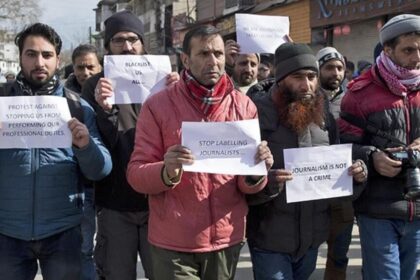Nostalgia is a Disease: Many would compare nostalgia to a warm, fuzzy blanket wrapped around their shoulders, reminiscing about a warm hug sprouting from the tender melodies of a year-old song, the soft clinking of dadi’s bangles, or the earthy scent that wafts through the house right before rain announces its presence. While for others — especially women — this particular feeling turns haunting, making them mourn not just the time they’ve lost but who they’ve become.
In South Asia, even our feelings have an ulterior motive. We learn early on that nostalgia here isn’t innocent. It is pervaded with a gendered exasperation — used to preserve romanticised pasts where women acted as nothing more than obedient sacrificial lambs for slaughter.
Even a seemingly innocuous phrase such as “hamare Zamane mein” carries a profound emotional impact. Often uttered in retrospect to the way things were in the past — simple and precise. This simplicity more often than not refers to the times when girls were nothing more than obedient soldiers waiting for their turn in the line of fire, the irreproachable honour they would bring to their family legacies by marrying men several decades older than them, or perhaps this supposed “simplicity” quotes wives who were nothing more than decorations in their husbands’ houses. Combine these with other traits of how women always acted back in the day, and you’ve got yourselves the ideal womanhood men dream about when muttering that melancholic phrase.
Nostalgia is a Disease
In these so-called golden days, women were praised for how well buried their dreams were — for the one who spoke less, smiled more, crossed legs, sat straighter, and kept her gaze lowered would undoubtedly be chosen as a bride. Hence, weddings became pacts, or more so competitions for who had the most benevolent daughter, with the dupatta placed on the bride’s head, heavy with the weight of all that had been buried and endured.
This tribulation is then paraded around and glorified in television dramas with the motive of “sabr wali biwi” and the villainisation of one who wants more. These women became romanticised enough to stay but never questioned whether they wanted to leave.
How nostalgic does this generation have to be to mourn decades we’ve never even lived in? We’ve never stepped foot in the 80s, never witnessed their shawls drying on the balconies or the sugar-dipped silence of wedding nights, and yet we mourn them as memories akin to family heirlooms.
The simple interpretation for this would be: well, we daughters have always been programmed this way. We know it because we’ve seen it either implicitly or explicitly from the TV dramas airing in the background playing on loop every second of the day and every shaadi function where a woman has smiled, albeit strained — they teach us that this is what femininity is supposed to be. Our grief is hand-fed to us, sung to us in lullabies with words wrapped in despair.
So, we prepare to sacrifice to patriarchy before we even know what it is. As for the preparation, it walks hand in hand with utter guilt; that same guilt reaches out, infecting each and every one of us, plaguing our thoughts for even being thought. Our apologies flow naturally; voices lower on instinct because it feels “proper”. Our mothers lose their places at the dining table and we realise that maybe womanhood automatically concurs with silence.
We’re gifted nostalgia as inheritance — a complete eulogy. The andaaz of a woman is stitched into us from the very beginning — oft-forgiving, soft, influencing our daily lives so much so that even the events held to celebrate us become ones to parade us in. Mehndis, where our palms are painted golden, and Eid mornings, where balancing a thousand different expectations becomes your new eidi.
Soon enough, we weep for a simpler time where women never asked for more and in return were given less. Hence, gracefully.
But a time comes where things change, expectations dissolve, and rebellion rises.
It emerges from wanting to cut our hair after it’s been vowed to grow, from overruling that familiar lump in your throat. Our daughters are taking up rebellion with their names — never by shouting but by rewriting. The rituals live in us, yes, but they don’t overpower. Our bangles glint with promise. Our spines refuse to bend, yet we bow to let our elders rest their palms on our heads.
So when the same expression of “Hamare Zamane mein…” comes floating back, our smiles cut across, and we stand with the postures of soldiers who know what they won’t die for. We learn the foreign word “no” and repeat it many times if it goes unheard. Our hands dig up space for new memories — one where our mother’s sacrifices aren’t mandated but warnings, where our rage turns sacred, burning away every expectation chained to us.
So our presence perches on the same table, yet it probes different questions. Our views demand tenderness, not transaction, and our wounds, draped by culture, become honoured. Because not everything that came before us deserves to be preserved.
So when others question our anger and why we refuse to let the venom-dipped words go unchallenged, tell them this: we remember too much. We remember how the word “simplicity” was code for silence. How women’s names were swallowed by marriage, their passions ironed into their dupattas. We gather our heirlooms of recipes, cookbooks, bruises, and sacrifices, carefully storing them in deep crevices of our hearts. Our nostalgia never ached for submission but rather reclamation.
We do not reject our past. We learn to walk with it towards something that is ours. We recaptured our essence. Neglecting to bleed the same way our mothers did, we do not mourn the past — we remember so we can walk forward without ever touching the shards of glass.















